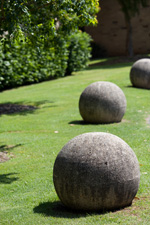Engineering (Hons)/Biomed Eng - 3768
Program Summary
Faculty: Faculty of Engineering
Contact: Biomedical School
Campus: Sydney
Career: Undergraduate
Typical UOC Per Semester: 24
Min UOC Per Semester: 6
Max UOC Per Semester: 24
Min UOC For Award: 240
UAC Code: 425950
Domestic Entry Requirements: See Domestic Entry Requirements
International Entry Requirements: See International Entry Requirements
View program information for previous years
Program Description
At the end of the program successful candidates will graduate with a Bachelor in Engineering (Honours) and a Masters in Biomedical Engineering. Students are expected to perform at a credit average (65%) or better in their first three years to be permitted to continue with the Masters part of the program. Students who do not satisfy this requirement can revert to the Bachelor of Engineering (Honours) program.
This dual program is currently offered for the following BE (Hons) specialisations only:
- Bioinformatics Engineering
- Chemical Engineering
- Computer Engineering
- Electrical Engineering
- Mechanical Engineering
- Mechatronic Engineering
- Software Engineering
- Telecommunications
Program Objectives and Graduate Attributes
Program Structure
Please see links below:
General Education Requirements
Students in this program must use one of their electives to satisfy the General Education requirement. This means completing at least one elective course from neither the Faculty of Engineering nor any School that provides another courses completed as a part of meeting the program requirements. In most cases, either a depth elective from the BE (Hons) stream or an elective from the Biomedical Engineering program will be used for satisfying General Education, however students are advised to consult with the Graduate School of Biomedical Engineering on specific advice for each engineering stream.
Honours
Honours is awarded as part of the Bachelor of Engineering (Honours) part of the program only. In addition, classes of honours are determined based on meritorious performance over the 168 UOC which forms the BE (Hons). The classes are awarded as follows:
- Class 1: WAM of at least 80 and Thesis Mark of at least 65
- Class 2 Division 1: WAM of at least 75 and Thesis Mark of at least 65
- Class 2 Division 2: WAM of at least 65 and Thesis Mark of at least 65
Courses will be weighted according to the following:
General Education 1
Level 1 Courses 1
Level 2 Courses 2
Level 3 Courses 3
Level 4 Courses 4
- First attempt counts
- Honours WAM to be calculated to one decimal place
Academic Rules
Progression
To ensure that all students who complete the program attain the honours level learning outcomes of the program, the progression rules for the program are as follows:
- No level 4 BE course until 102 UOC of BE stream passed
- No level 3 BE course until all Introductory core passed
- If any of the conditions below apply, students will be transferred to the Bachelor of Engineering Science program, with such transfer subject to appeal:
- 2 fails in any given core course
- After half or more of the BE stream attempted (more than 84UOC), 50% or more of BE stream courses have been failed
- Prior to the final 48 UOC of the stream (120 UOC or more of the BE stream completed), a WAM of less than 50%
Students may substitute up to 12 UOC of Advanced Disciplinary courses (Level 5) in place of Disciplinary Knowledge courses from a school specified stream list of courses with the approval of the Program or Stream Authority.
Fees
Industrial Training
Professional recognition
The professional body for engineering in Australia is Engineers Australia, which has as its first objective the promotion of the science and practice of engineering in all its branches.
Engineers Australia has its national headquarters in Canberra and functions through a series of divisions, the local one being the Sydney Division. Within each division are branches representing the main interests within the profession, e.g. civil, mechanical, electrical, engineering management and environmental engineering.
Students of an approved school of engineering may join the Institution as a student member (StudIEAust). Student members receive the monthly publication Engineers Australia and for a small fee they also receive The Transactions which contains articles on a particular branch of engineering.
Student members are invited to participate in the Excellence Award for Work Experience, the National Young Engineer of the Year Award and to avail themselves of other Engineers Australia services including the Mentor Scheme and industrial experience guidance.
For more information and membership application forms, contact Engineers Australia, Sydney Division, Level 3, 8 Thomas Street, CHATSWOOD NSW 2067 - telephone 02 9410 5600 www.engineersaustralia.org.au
Area(s) of Specialisation









